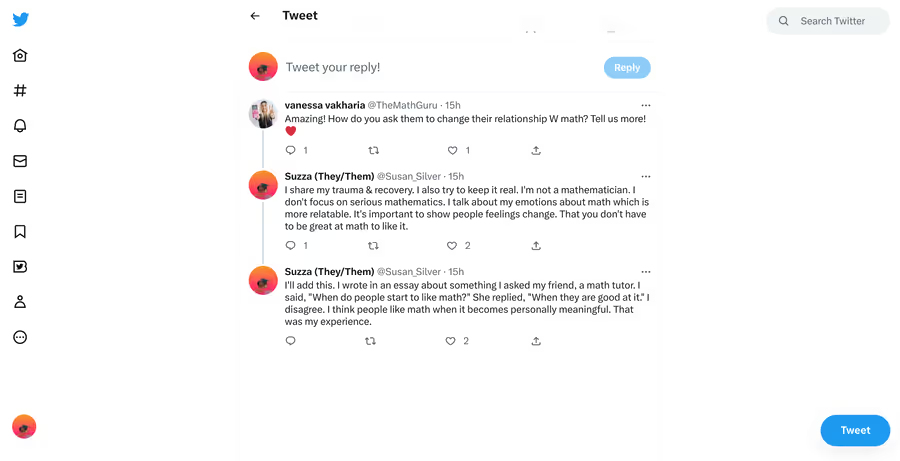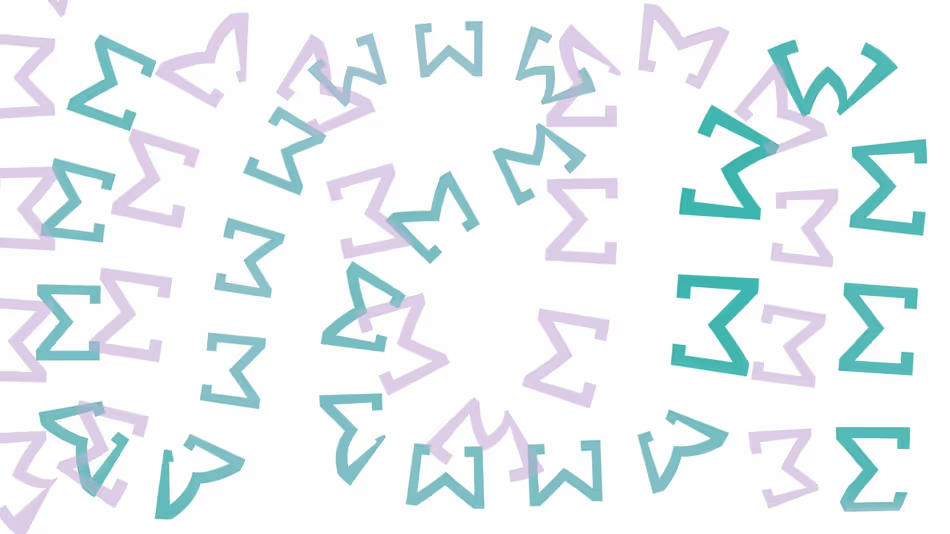I’m not sure yet what my place is in the math community. Do I call myself a math communicator? I don’t know what my credentials are other than loving mathematics.
When I started this blog, I had one idea in mind as I explained in this Tweet.

“I share my trauma & recovery. I also try to keep it real. I’m not a mathematician. I don’t focus on serious mathematics. I talk about my emotions about math which is more relatable. It’s important to show people’s feelings change. That you don’t have to be great at math to like it.”
- Suzza Silver
This is a scary subject for those who have math anxiety. I wanted instead to spend my time on things less frightening. For me, that is the emotional world where I can talk about fear and recovery. Hopeing to show people another and more positive idea of mathematics.
Making Friends with Fear
I learned in high school through an exercise in a sociology class my style for dealing with fear. At first, I may feel anxious and things might be trepidatious. Yet, I sit with that fear. I stare at it and try to understand and allow myself to feel my feelings. Then I make friends with it. This ends up resolving my issues for the most part.
My family was very supportive in that they would take me to the library to read books. They didn’t censor anything and this is how I ended up reading 1984 in fourth grade. One week when I was in junior high, I took out a physics textbook. When my dad saw this he asked, “Do you want to return that and get another book?”
What he did not understand is that this was on purpose. At this point, I had already read my first Hawking book and this awakened a desire in me to understand cosmology. I took the textbook because I heard that physics was a difficult subject. Feared by people. Reading that textbook was my way of making physics friendly.
Obstacles and Trauma
I developed a love for math in fifth grade when I repeated mathematics from the previous year. I did not yet understand multiplication. Eventually, I found a way to make friends with math. Treating it as a language, replacing numbers with letters. This allowed me to see the grammar of an equation.
This did not make my life with mathematics easier. In fact, it made it harder. My family couldn’t relate to my interests. I had more in common with them when I was math anxious. I couldn’t talk to them about it. So, I played my own math games in my room by myself.
I did not have much luck with my math teachers either. Mrs. Fox, who had recommended that I repeat fourth-grade mathematics, was the last one who cared to help me. Some of my teachers implied that I was bad at mathematics because I was slow and struggled.
Unfortunately, some people view our abilities as fixed. Instead of helping us grow our potential. For some kids, the time constraints of a semester are not enough time to learn. That doesn’t mean we should give up on them as if they cannot understand.
In High School, I fought with my parents over taking math classes. I wanted to get ahead on subjects by taking Algebra 2 during Summer School. My dad did not understand my motivation until I explained to him that I wanted to take AP Calculus in my senior year. He tried to talk me out of it and finally relented.
At the age of 18, the damage was done.
Repeated negative messages about mathematics convinced me not to seek a math degree.
Why Math Communications Matter
If I had met a mathematician anytime before college, it would have changed my trajectory. It wasn’t until my thirties, through Numberphile, that I found a community. I understand now that mathematicians are people like me.
I am unsure of my role in math communications. Should I include myself in this category when I don’t have a degree? I’ve had a lot of thought on this subject but no answer yet. I have gathered some inspiration from Martin Gardner. He popularized recreational mathematics but was not a mathematician. He also did not have a degree in math.
If my role is to be an enthusiastic supporter of math communicators then that is okay with me. I point people in the right direction when it comes to those resources. In fact, I have a list of more than 100 links if you are math curious.
If you are a mathematician, here are some projects to communicate science with the public.
When I started this blog, I didn’t know what journey I was on. I recovered many memories of the pain that I went through as a kid. Searching for one person who could understand how I felt about math.
As an adult, I now see this writing as a form of rebellion. I finally dare to fight those negative thoughts in my own mind by sharing my stories. I no longer have to suffer in silence.
I’m hoping that there is a math communications conference in the US. Something that I have started looking into. I am putting forth an effort to make it happen. Ping me if this interests you.
This is my current anthem. (NSFW)

